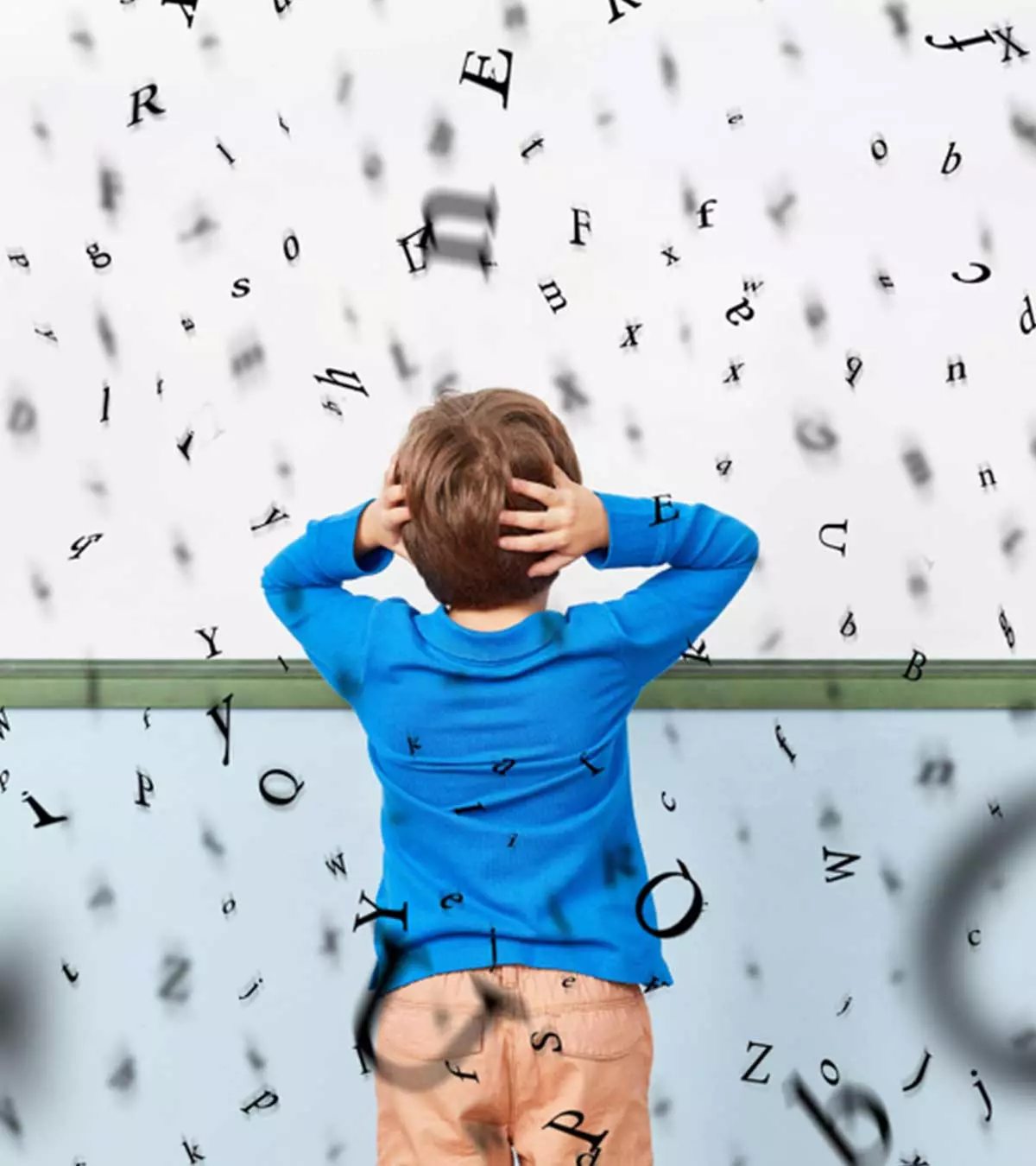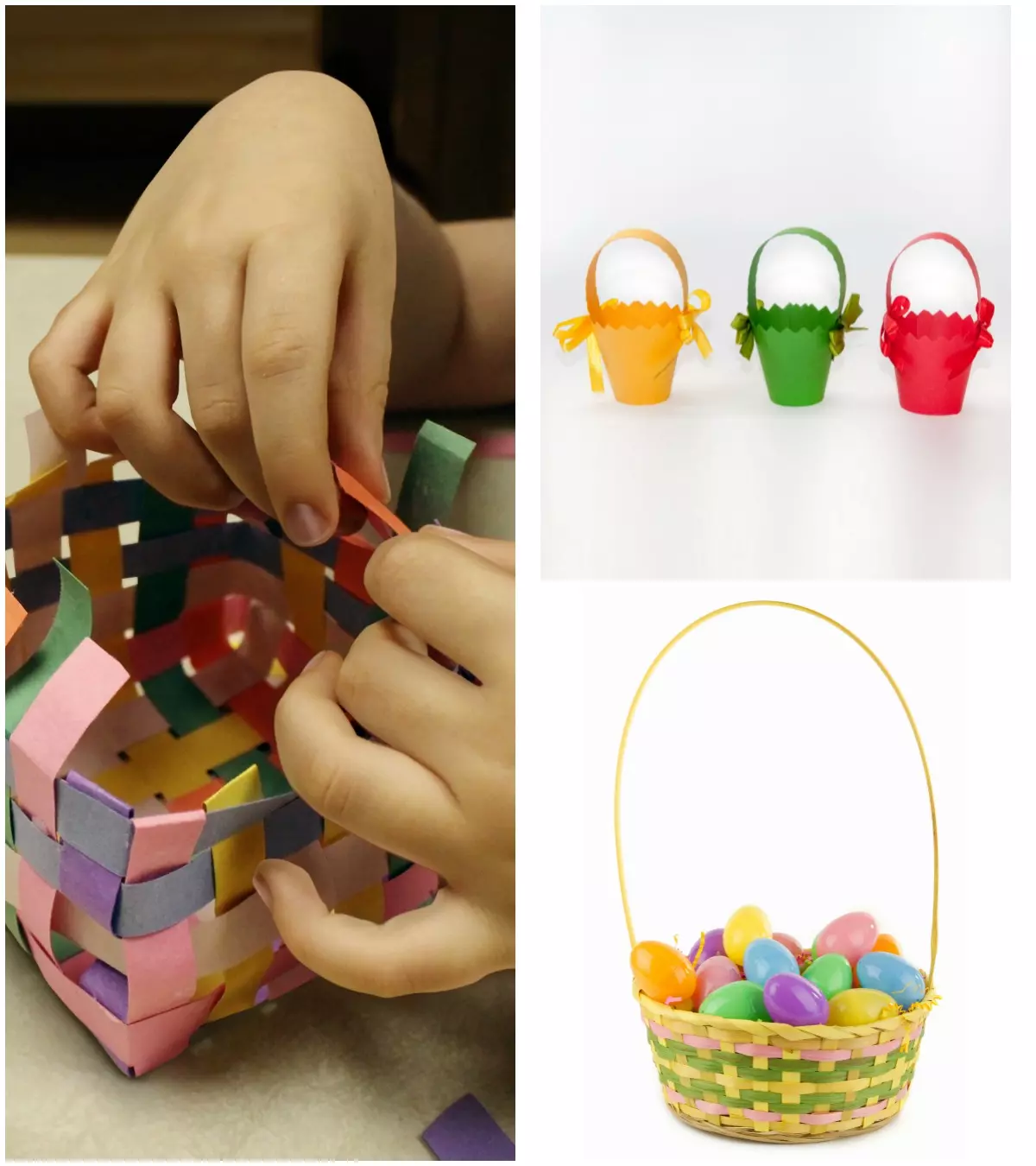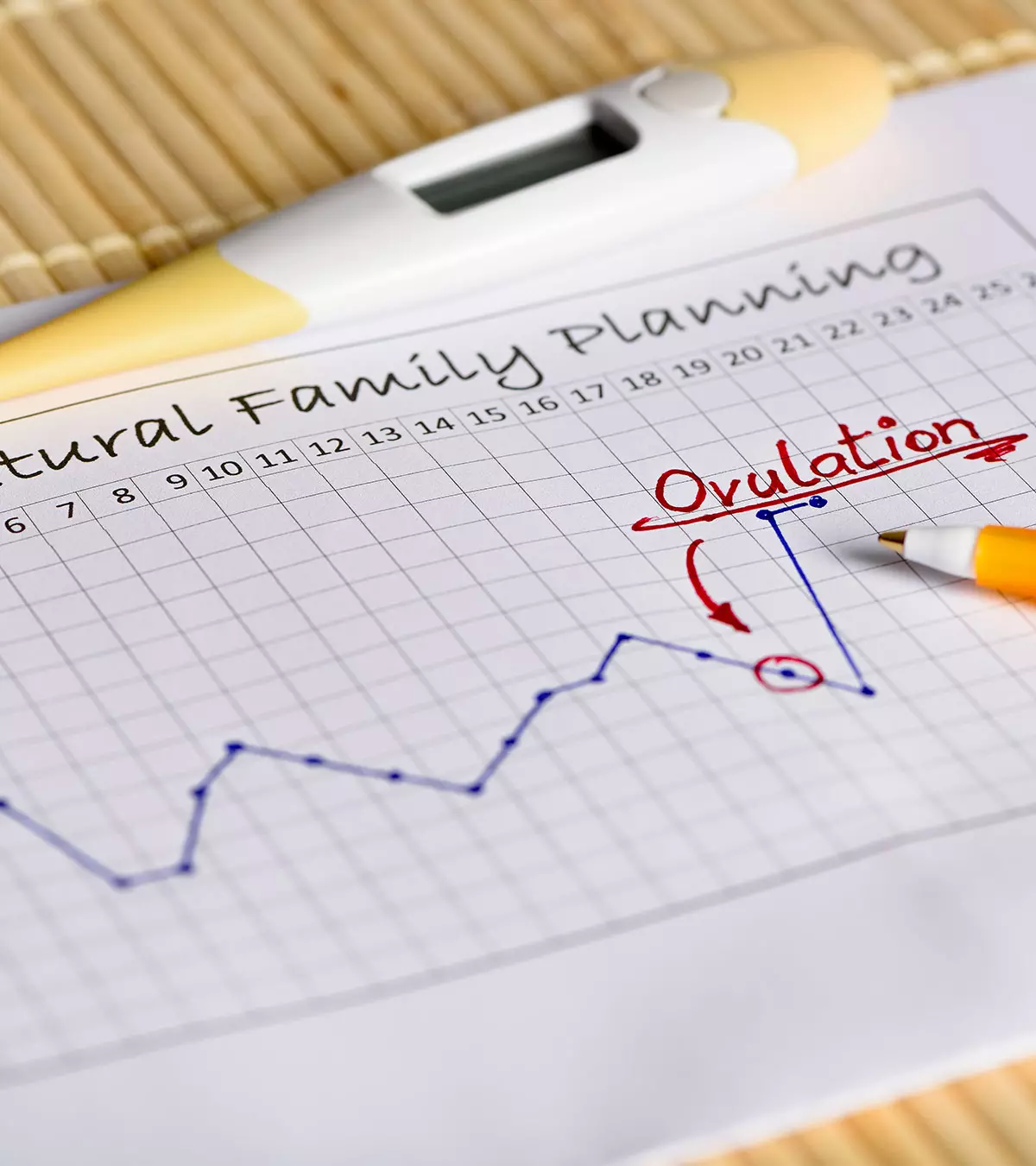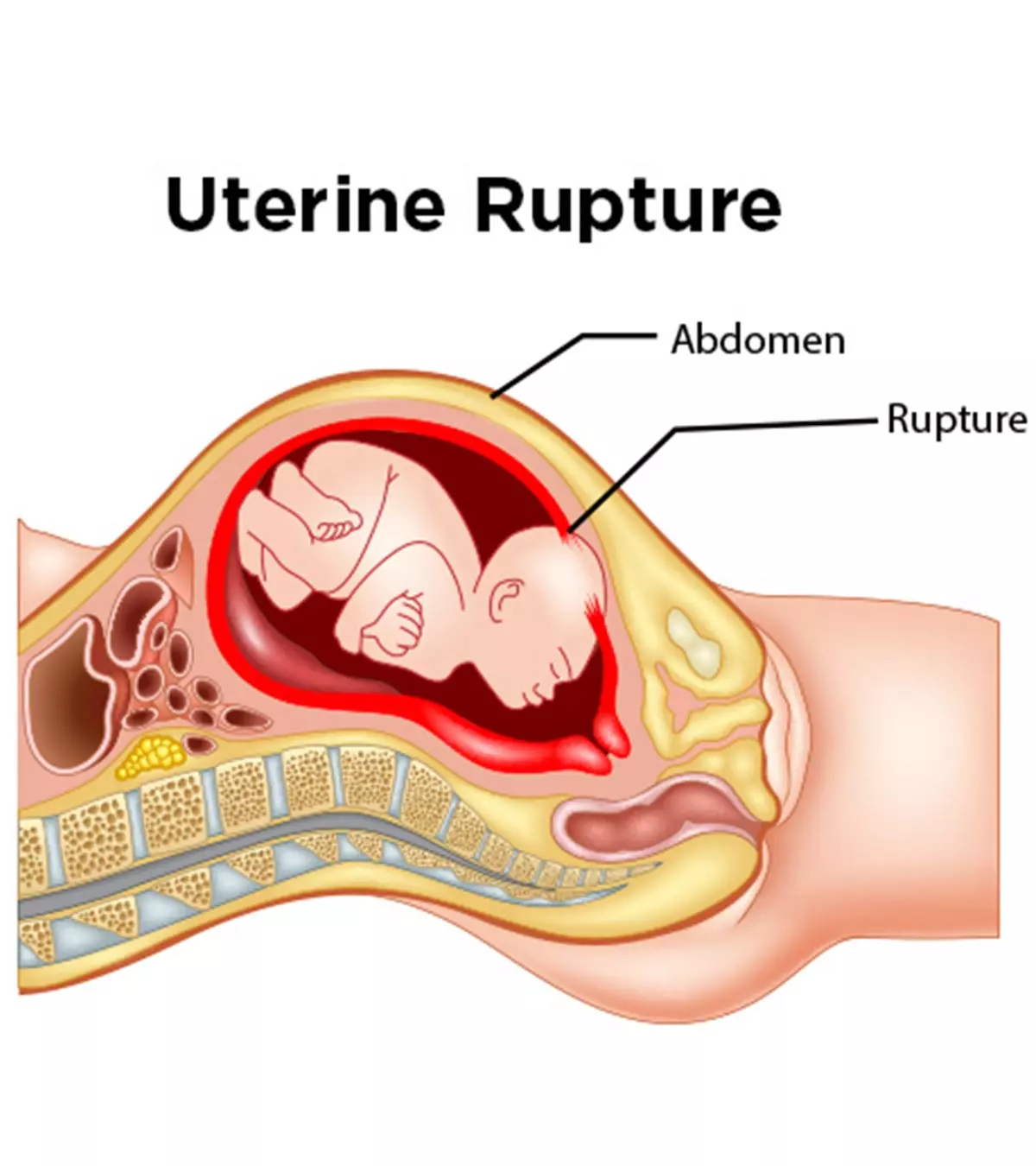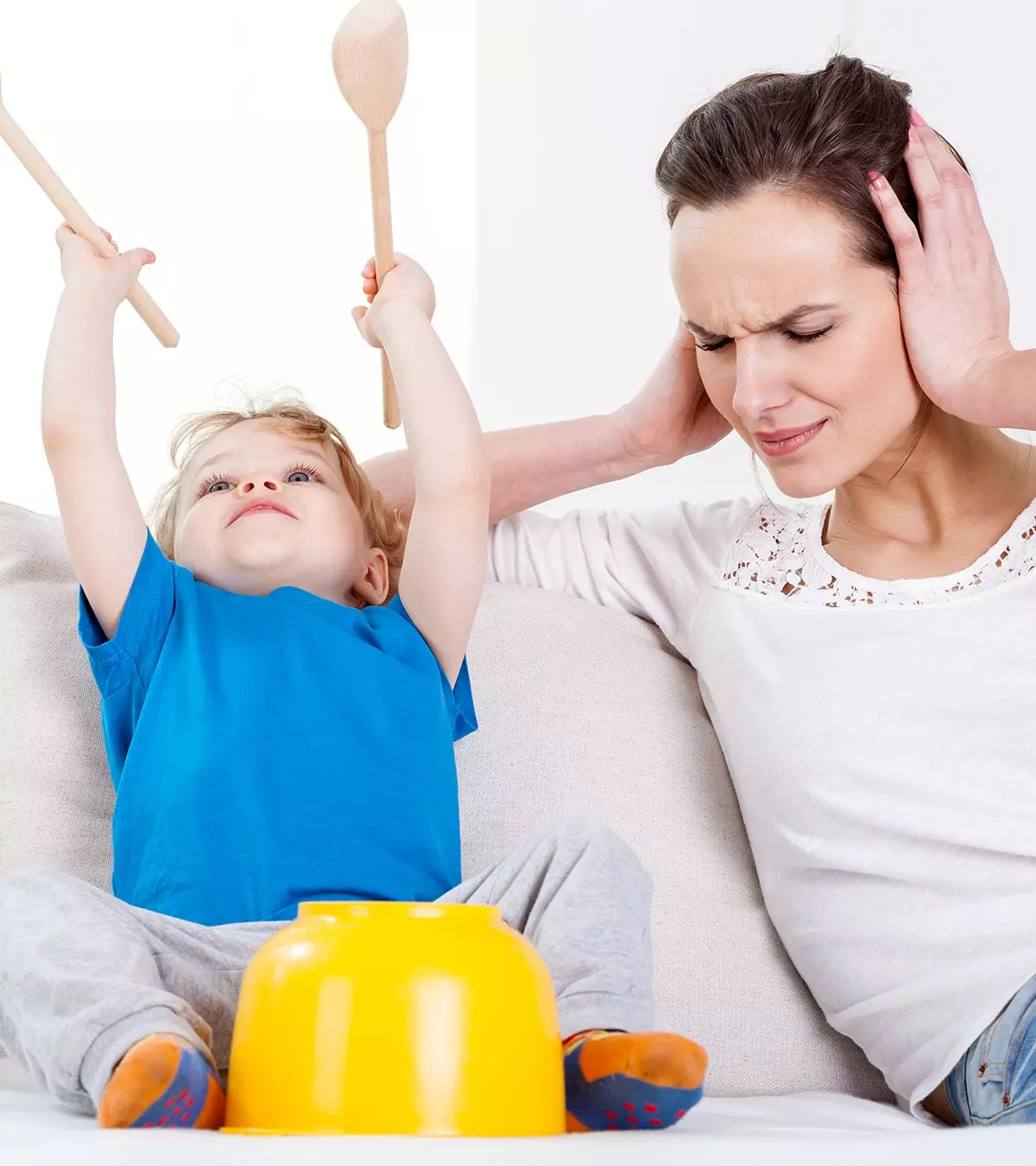

Image: Shutterstock
Most toddlers appear to be highly energetic, and you may hardly find them sitting idle at one place for a certain amount of time. However, if your child is hyperactive and always full of more than normal energy, it could indicate a neurodevelopmental disorder like ADHD in toddlers. If you suspect altered behavioral patterns in your child, it is wise to speak to a therapist, neurologist, or pediatric specialist who can evaluate your toddler’s condition and suggest a way forward. Keep reading to explore the signs, diagnosis, treatment options, and more about ADHD in toddlers.
What Is ADHD?
ADHD stands for attention deficit hyperactivity disorder and is a neurodevelopmental problem. As the name suggests, it is an inability of the toddler to maintain attention or concentration for a duration considered normal for their age. The toddler tends to daydream and often forgets instructions.
There is also hyperactivity, which prevents the toddler from being calm and obedient. Attention deficit and hyperactivity may occur independently or together.
According to a survey conducted by the US Centers for Disease Control and Prevention (CDC), about 237,000 toddlers suffered the condition in 2011-12. The number had increased by 50% since the last study in 2007-08 (1). A recent study indicates that as much as 10% of childhood population suffers from ADHD.
The precursor to ADHD was ADD, attention deficit disorder. This definition only included attention deficit symptoms and did not encompass hyperactivity. In 1994, researchers merged attention deficit and hyperactivity into a single syndrome and named the condition ADHD. According to the new classification (DSM-5), ADHD can present as inattentive, hyperactive or combined (inattentive and hyperactive). Each category has its unique symptoms.
What Are The Signs And Symptoms Of ADHD In Toddlers?
ADHD symptoms depend on the sub-type a toddler has. Here is what to look for in each category.
1. Predominantly inattentive
Here, the toddler is inattentive and gets distracted easily. This condition was originally called ADD as no hyperactivity and impulsive behavior was noted. A toddler, who is predominantly inattentive, has the following symptoms.
- Daydreams and lacks attention towards the task at hand, whether it is a game or an activity
- Has trouble following instructions and even if he does, forgets them immediately
- Does not seem to listen when someone speaks directly and looks around, and seems to be distracted
- Misplaces and loses objects such as toys even at familiar places like home
- Usually avoids activities that require sustained efforts
- Has trouble organizing objects such as stacking building blocks, and may abruptly lose track of the number of blocks
- Get easily distracted while playing and doesn’t stay focused on the toy.
2. Predominantly hyperactive-impulsive
The symptoms here are divided into two sections – hyperactivity and impulsiveness.
i) Hyperactivity
The toddler is excessively energetic to the point that they seem reckless. Below are the symptoms of a hyperactive toddler.
- Does not remain seated in one place, and is always sprinting around with no regards to the place and people
- Fidgets with objects
- Runs, jumps, and clambers around even when reminded not to do so
- Talks too much
- Makes noises while playing despite being repeatedly reminded to stay quiet
ii) Impulsiveness
The toddler is brash and displays an innate lack of patience and discretion. The symptoms of the condition are:
- Interrupts those speaking around whether it is adults or other toddlers
- Appears impatient when waiting for their turn, such as in a game, and jumps the queue to get to their turn quickly
- Answers a question even before it is complete; also, during a game, will shout the answer even when instructed not to do so
- Intrudes others, for example, snatches a ball from a toddler to play with it
- Does dangerous things such as ride a tricycle into a busy road
Unlike the symptoms of hyperactivity or inattentive behavior, which may not last long, symptoms of ADHD last for at least six months!
3. Combination presentation
Toddlers in this category might have inattentiveness, hyperactivity, and impulsiveness. Therefore, they display combined symptoms of predominantly inattentive and predominantly hyperactive-impulsive.
Here we give you the gist of all the symptoms:
| ADHD type | Symptoms |
|---|---|
| Inattention | Daydreaming and lack of attention |
| Trouble following instructions | |
| Distraction during conversations | |
| Misplacing and losing personal items | |
| Inability to organize objects | |
| Avoiding cognitive effort | |
| Lack of focus and repeated distraction | |
| Hyperactivity | Sprints around restlessly |
| Fidgets with objects | |
| Clambers even when scolded | |
| Talks too much repeatedly | |
| Always makes loud noises while playing | |
| Impulsivity | Interrupts those who are talking |
| Constant impatience | |
| Gives unsolicited answers to questions | |
| Takes things without permission | |
| Does impulsive and dangerous actions |
The signs of ADHD seem to perturb. But did you know, they do not develop overnight, and there is a way to spot the condition early? There are some signs you can notice.
Early Signs Of ADHD In Toddlers
Parents can get a hint of ADHD with these first signs:
- You get a feeling that they never listen to you – almost as if you were invisible.
- You send the toddler to their room to get something, and they cannot follow it. When you check on them, they might be playing somewhere oblivious to your instructions.
- They ask too many questions and may sometimes repeat them. Even when answered, they may not remember the answer.
- The preschooler loses countless lunchboxes and water bottles almost every month.
- They do not remember what they did at their preschool.
- Their preschool teachers and caretakers use words such as hyperactive, reckless, or extremely aloof to describe their classroom behavior.
Not every toddler who displays the above signs has ADHD.
The American Academy of Paediatrics (AAP) states that it is hard for parents to tell for sure if the little one has ADHD until they are of school age (2). According to AAP, at least six symptoms are needed in each category to confirm ADHD in a toddler.
Therefore, it is good to learn ways to distinguish ADHD from normal toddler behavior.
How To Differentiate ADHD From Normal Toddler Behavior?
The symptoms of ADHD may seem to overlap with typical toddler behavior, but there are ways parents can discern ADHD from normal demeanor:
- ADHD behavior lasts at least six months: Unlike typical hyperactive and inattentive behavior, which fluctuates, ADHD symptoms should last for at least six months. The preschooler displays consistent symptoms irrespective of external stimuli such as place or people.
- Toddler’s conduct is not right: As parents, you may be able to guess that something is not right with the little one. Some traits appear abnormal and not at par with how other toddlers at that age would behave. Their behavior could make the toddler stand out in a group.
- Lags in development: When you set a benchmark against other toddlers, you realize your preschooler lags behind. This is because while other toddlers progress in their behavioral development, a toddler with ADHD may appear to be slow.
- Normal life of the toddler is impacted: ADHD affects a preschooler’s day-to-day routine. It has an impact on a toddler’s social skills and ability to learn at preschool. Hyperactivity can cause anger issues while inattentiveness may lead to low self-esteem – attributes that are obstructions to a normal life. They are not aware of dangers.
A toddler who displays ADHD-like symptoms only in one particular environment is probably facing some other problem and does not necessarily have ADHD.For example, a healthy toddler could become inattentive at preschool because he finds it boring. However, when preschool subjects are taught at home, he pays attention and learns well.
This makes it important to discern attention deficit and hyperactivity carefully as they have different causes.
What Causes ADHD In Toddlers?
There is no single precise reason for ADHD, but anomalies and conditions that have been noted to lead to ADHD (3) are:
- Hereditary: It is a leading cause of ADHD, and inheritance of an ADHD gene is a scientifically-proven reason behind ADHD in toddlers (5). The AAP states that ADHD runs in families and the toddler’s risk of having it is higher if the parent or siblings have it.
- Neurological problems by genetic mutations: Genes that code for nervous system develop unfavorable mutations that affect the function of neurons and impact the overall health of the brain. For instance, toddlers with ADHD have low levels of neurotransmitters, which are chemical messengers that transmit impulses between neurons. A 10-year-study by the US National Institute of Mental Health, has found that toddlers with ADHD have 3-4% smaller brains than those with no ADHD. Therefore, neurological abnormalities through genetic mutations exacerbate the chances of ADHD behavior.
- Mother’s lifestyle during pregnancy: Smoking, consumption of alcohol, and coming in contact with toxins and harmful chemicals during gestation increase the risk of ADHD during toddlerhood (9).
- Environmental factors: The presence of toxins and chemicals in the air or in a toddler’s food may cause ADHD. Lead is one such toxic element that has been linked to ADHD, and toddlers can be exposed to it through contaminated food and water.
- Premature birth: A preterm infant is at a higher risk of suffering from ADHD. The underdeveloped nervous system of a premature baby is susceptible to random genetic mutations, which can cause neurological problems and thus ADHD.
- Low birth weight: Low birth-weight of a normal full-term infant has been associated with ADHD, although it is less common, and does not have a precise reason for it.
- Brain injury: A brain injury sustained due to problematic delivery may cause ADHD. Severe brain injuries, caused due to a fall, can also cause the condition. However, ADHD due to brain injuries happen rarely and are uncommon.
While the reasons behind ADHD are complex, parents may confuse several conditions to be the cause for ADHD. In reality they have nothing to do with the disorder.
What Are The Misconceptions About ADHD’s Causes?
The CDC states that ADHD in toddlers is NOT caused by (3):
- Family stress
- Traumatic experiences
- Watching too much television
- Eating excess sugar
- Poor parenting skills
- Allergies
- Side effect of medicines and immunization
While the fundamental cause of ADHD may not be entirely clear, doctors rely on mental composure of the toddler to diagnose the condition.
How Is ADHD Diagnosed In Toddlers?
Toddlers as young as two can be diagnosed with ADHD. Experts state that there is no single test to detect the condition but several diagnostic steps are needed to conclude its presence (4). The diagnosis of ADHD is made by a neurodevelopmental pediatrician, specialist psychiatrist, or psychologist through a series of procedures.
- Medical examination: The doctor conducts speech, vision, hearing, and cognitive tests to assess if the toddler has any developmental delay or problem instead of ADHD. The toddler may be referred to a therapist to confirm if they have any development issues. If all tests turn out normal, then the doctor proceeds to the next set of procedures.
- Interviewing guardians: Parents are asked about the conduct of the toddler at different places – home, outdoors, and school. The medical history of the toddler is also analyzed to assess if he suffered from any mental or physical developmental problems in the past.
- Using the ADHD checklist: Doctors give parents and caretakers a questionnaire on ADHD in preschoolers. This ADHD-related quiz is taken from Diagnostic and Statistical Manual of Mental Disorders (DSM) published by the American Psychiatric Association. The list primarily contains the above-stated symptoms.
- Parents observe their toddler for a couple of weeks and tick the symptoms displayed by the toddler. The doctor then analyzes the symptoms displayed. As mentioned earlier, at least six symptoms are needed in each category to confirm ADHD in a toddler. Also, these symptoms should manifest across a minimum of two different environments, for example at home and preschool (5).
- General observation: ADHD is the most difficult to diagnose in toddlers since several typical toddler behavioral traits overlap with ADHD symptoms. Therefore, the doctor will ask parents and caretakers to be extra observant. Symptoms of ADHD are noted with date, place, and time. This helps the doctor detect a pattern, determining the disorder.
A conclusive diagnosis is made once all the steps point towards ADHD. The treatment steps are then initiated right away.
How Is ADHD Treated In Toddlers?
There is no precise treatment for the condition and fundamentally there is no cure for ADHD. The treatment only aims at managing the problem effectively (6). The leading choice of ADHD treatment in toddlers is behavioral therapy, and medicines are used as a last resort. Below we present the multifaceted approach to treat the condition.
- Behavioral therapy: There are two components of this treatment – parent training and toddler training. Toddlers are trained to reinforce positive, non-ADHD behavior, while parents are trained in the right ways to encourage such conduct. Behavioral training varies for different ADHD toddlers. It depends on multiple factors such as the toddler’s age, overall temperament, and severity of the symptoms. In toddler training, the therapist conducts sessions to bolster habits that slowly deviate the little one from the symptoms. It is achieved through unique games and activities that involve a coherent cognitive function, which is opposite of ADHD symptoms. These do not work overnight, and a toddler has to attend sessions every day for an extended duration.
Parents are also trained to stimulate non-ADHD behavior at home and monitor the toddler’s progress. Parents are taught counseling techniques to control hyperactive and inattentive toddlers. A combination of parent and toddler behavioral therapy is the best to tackle ADHD in a preschooler. And, most experts attribute behavioral therapy as the safest and most efficient form of ADHD treatment for toddlers.
- Medications: Medicines are seldom used with toddlers. Nevertheless, they could be considered by a doctor when behavioral therapy fails due to severe ADHD. Medications are of two types – stimulants and non-stimulants.
Stimulants are medicines that mimic neurotransmitters (brain chemicals) such as dopamine. These medications affect the brain function, slowly altering and normalizing the behavior of an ADHD toddler. Stimulants are most effective form of medical treatment of ADHD, providing relief to almost 80% of patients and showing quick results. However, their effects last for a few hours, thus making them useful only when prescribed as a course of dosage.
Non-stimulants tackle specific symptoms such as hyperactivity and inattentiveness. These medicines help improve the toddler’s attention, and cut down impulsivity. Non-stimulant drugs are slow at showing results, but once an effect sets in, it can last for up to 24 hours. These medicines are prescribed when a toddler shows adverse effects to stimulant medication.
- Skill training: The toddler is given specialized training to make up for the loss of skills due to poor attention and hyperactivity. A set of remodeled skills leads to greater deviation from ADHD symptoms. Training is provided by certified trainers who deal with ADHD toddlers. The skill training works in conjunction with conventional forms of treatment that are behavioral therapy and medication.
Besides the above, there are some cures for ADHD. But these may not always work in treating the condition.
What Are Some Alleged Cures Of ADHD?
The following purported cures for ADHD have no scientific backing and parents must avoid them:
- EEG biofeedback – a process that increases the brain-wave activity
- Applied kinesiology – where the bones of the skulls are “realigned”
- Anti-motion-sickness medication for hyperactivity
- Vision training to improve vision and reduce inattentiveness
- Reducing a toddler’s sugar consumption
- Vitamins and mineral supplements, often given as a natural home remedy for ADHD in toddlers
The AAP states that parents must double check the veracity of any claimed treatment of ADHD (7). It is best to stick to the advice and treatment of a doctor. However, ADHD is a condition that requires management at home.
How Can Parents Manage ADHD?
A toddler is quite likely to carry ADHD to adulthood since the disorder has no cure. The daily management of ADHD is thus essential to make life convenient. The CDC, suggests the below tips to manage ADHD in toddlers.
- Maintain a daily routine: Hyperactive toddlers may get overwhelmed by unprecedented events. Setting a daily routine helps offset it by making the day predictable. Maintain a fixed time for every activity in the preschooler’s routine from waking up, playing, studying, all the way to going to bed.
- Keep things organized: Maintain a fixed spot of storage for toddler’s personal items and encourage the little one to keep it at the same place after every usage. For instance, after play time, toys go into the same box; clothes go into the same cupboard. It helps the toddler feel confident about living life with ADHD.
- Offer limited choices: Keep the choices minimal and definite so that the toddler is not overwhelmed. It does not mean that you do not allow the toddler to choose. It is just that when offering something, such as a snack, give no more than two options. It improves the decision-making ability of an otherwise impulsive toddler.
- Manage the distractions: Keep the TV off when it is not the time to watch and toys neatly shelved when it is not playtime. Lesser the distractions, the better the preschooler can concentrate on the tasks at hand. If the toddler throws a tantrum, and wants to watch TV, consider an alternative such as playing soft music in the background. Some toddlers with ADHD concentrate better when there is a simultaneous background activity such as music, sounds of birds chirping, or sitting on a rocking chair.
- Give clear and consistent instructions: A toddler with ADHD will have trouble understanding complex instructions, which other preschoolers comprehend easily. Keep the communication clear, consistent, and simple.
- Plan with positive activities: Preschoolers with ADHD may find some games and activities stressful, while they would enjoy others. Stick to the ones that are enjoyable, and leverage the activity to reinforce positive behavior.
- Praise and reward: Appreciate the toddler every time they behave in a manner that deviates from ADHD symptoms. If the toddler repeats an unfavorable activity, then instead of scolding, use penalties such as cutting down privileges.
- Set goals for improvement: Parental management is of no use unless you keep track of the progress. Set a target to achieve for every step taken to assess if the preschooler has attained the desired outcome. For example, if you reduce the distractions for better attentiveness, then observe the toddler over the course of the next few weeks. If you notice an improvement in concentration levels, then it indicates you have arrived at the desired outcome.
It is essential for parents to observe their toddler and review their management steps. Parents can succeed with it, but the challenge lies in teaching.
Teaching A Preschooler With ADHD
It’s hard to preschool a toddler with ADHD since the symptoms often interfere with the learning process. Here are a few tips for parents to get the little one to learn better:
- Seek specialized teachers: Select a preschool with teachers that can teach toddlers with special needs, and are certified to train toddlers with ADHD.
- Follow-along revision: Repeat the topic the same evening the toddler learns it in schools. This will reinforce the topic in the toddler’s mind.
- Use audio-visual materials: Toddlers with ADHD learn better with the use of audio-visual study material. Incorporate the use of such study materials in teaching the toddler letters and numbers.
- Check student performance periodically: Meet the teachers regularly and ask them about the progress of the preschooler. It also helps you get insights into the toddler’s behavior at school.
Frequently Asked Questions
1. Can I detect ADHD in a two-year-old?
The American Academy of Pediatrics recommends diagnosing ADHD in children older than four. However, it doesn’t mean that a toddler won’t have ADHD. The delay in symptoms, such as hyperactivity and tantrums, can also be seen in toddlers without ADHD (8).
2. Do toddlers with ADHD sleep well?
Toddlers with ADHD have an increased risk for sleep problems. These sleep issues can be related to medical or behavioral reasons. Trouble falling asleep or staying asleep can be seen in toddlers with ADHD. However, parents can manage sleep issues in toddlers with the right strategies (9).
3. Do toddlers with ADHD have speech delays?
ADHD can be associated with speech, gross, and fine motor delays. Frontal lobe involvement can be the reason for speech delays since this brain area is involved in speech and language development and also plays a role in ADHD. However, speech delays can be more evident around preschool age (10).
4. Can toddlers grow out of ADHD?
Approximately 50% of ADHD may continue to adulthood in most cases. Only 10% of children may outgrow the condition. In most cases, ADHD can manifest in different ways throughout the lifetime. There can be times with unmanageable symptoms or when symptoms are under control (11).
Although ADHD in toddlers may cause hindrance in their day-to-day activities and learning process, it can be managed with appropriate treatment and therapy. One needs to have patience and utmost understanding while dealing with toddlers having this condition. It is not an alarming condition and should not stop them from having fun and availing all the benefits of a happy life. With little effort and the above-mentioned effective tips, your toddler with ADHD can go to school, make friends, learn and lead a normal life.
References
- ADHD: Clinical Practice Guideline for the Diagnosis Evaluation and Treatment of Attention-Deficit/Hyperactivity Disorder in Children and Adolescents.
https://publications.aap.org/pediatrics/article/128/5/1007/31018/ADHD-Clinical-Practice-Guideline-for-the-Diagnosis?autologincheck=redirected - ADHD And Sleep In Children.
https://www.sleephealthfoundation.org.au/pdfs/ADHD.pdf - The connection between ADHD speech delays motor skill delays sensory processing disorders and sleep issues.
https://ct.counseling.org/2015/01/the-connection-between-adhd-speech-delays-motor-skill-delays-sensory-processing-disorders-and-sleep-issues/ - Just 10% of kids with ADHD outgrow it study finds.
https://www.sciencedaily.com/releases/2021/08/210813100258.htm
Community Experiences
Join the conversation and become a part of our nurturing community! Share your stories, experiences, and insights to connect with fellow parents.
Read full bio of Dr. Deepshikha Thakur
Read full bio of Rohit Garoo



